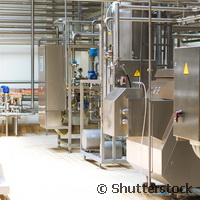Green business from recycled dairy wastewater
An innovative new way of treating dairy wastewater and whey could cut water and energy consumption dramatically, saving the food industry millions of euros. The EU-funded project REWAGEN ('Electrochemical water treatment system in the dairy industry with hydrogen recovery and electricity production') is currently developing a pilot plant to prototype the innovative treatment. "The project aims to link wastewater treatment to energy production as an efficient means of managing dairy industry effluents - whey and wastewater," says project coordinator Alexander Karos of Fraunhofer IGB in Germany. "It will accomplish this by the production of electricity through the recovery and purification of hydrogen generated as a by-product in electro-chemical processes." The pilot plant will act as an energy-efficient water-treatment system. The electricity generated through hydrogen conversion is used to operate the system. This solution could be applied for other sectors too, such as biodiesel production, olive processing and animal slaughter. Since starting in the summer of 2012, the REWAGEN team has already made significant progress. Experiments have begun at the laboratory scale, with the first results from the pilot plant expected towards the end of 2014. These include a predicted 10 percent reduction in energy consumption, a 30 percent cut in water consumption and a wastewater recycling rate of between 80 and 95 percent. By 2016, REWAGEN will have developed an environmentally friendly treatment system for dairy wastewater and whey, integrating energy recovery and the reuse of treated water. It will also have developed a way of separating fats and oils, and an electro-oxidation unit to allow for simultaneous wastewater treatment and hydrogen recovery. "The food and beverage sector is one of the largest industrial sectors in Europe in terms of turnover," says Karos. "Environmental issues in the food-processing industry are diverse, but one of the main issues is wastewater prevention and treatment." Indeed, the food sector has traditionally consumed large quantities of water either as an ingredient, or as a cleaning aid, or as a means of conveyance. By improving the environmental and economic sustainability of wastewater treatment in this sector, REWAGEN has the potential to open up new business opportunities. "This project will contribute to the growth of the global market for environmental technology and services, the competitiveness of the EU economy and also create jobs," continues Karos. "It is worth considering that water and wastewater services provide close to 600 000 jobs in Europe, with an overall investment of more than 33 billion annually and a turnover of around 72 billion annually. Therefore, the development of new wastewater- and whey-treatment technologies could open commercial opportunities in an attractive market." Jobs could also result from the development and manufacturing of the technology required to produce energy from hydrogen. Karos adds: "Companies are also looking to invest in technologies to treat emissions with the lowest operative costs possible. This project can therefore stimulate the production of fuel cells or alternative systems capable of converting hydrogen into electrical energy." REWAGEN is scheduled for completion in May 2016. The EU provided EUR 4.6 million in funding to the project.For more information, please visit: REWAGEN http://www.rewagen.eu/index.html Project factsheet
Countries
Germany



